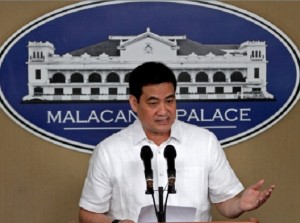Palace tells Carpio: We’ve junked PDAF
As far as Malacañang is concerned, President Aquino has abolished the graft-ridden Priority Development Assistance Fund (PDAF) and that’s all there is to it.
Presidential spokesman Edwin Lacierda said the Palace wasn’t bothered by the comments of Senior Associate Justice Antonio Carpio on Tuesday during oral arguments in the Supreme Court that the provisions on PDAF in the 2013 General Appropriations Act (GAA) were “riddled with unconstitutionalities.”
“You know, the President has already announced that the PDAF has been abolished. So that has been abolished,” Lacierda told reporters in a briefing, giving a hint on how the Solicitor General will present the government side on the PDAF at the resumption of the high tribunal’s hearing on Thursday.
“They want to declare it unconstitutional. And so they want to make sure that it will no longer be enacted in some other time,” Lacierda said. “But, as far as the executive branch is concerned, the President has already stated that we have abolished the PDAF.”
He declined to say whether the abolition of the PDAF, announced by Aquino on Aug. 23, would weaken, if not prod the justices to dismiss the petitions seeking to void the PDAF in the Supreme Court.
Article continues after this advertisementLacierda said the executive department believed the petitioners sought to declare the PDAF unconstitutional to prevent its misuse in the future.
Article continues after this advertisementThe President announced he was scrapping the PDAF in a nationwide TV broadcast three days before the Million People March prompted by public outrage over an alleged P10-billion racket engineered by detained businesswoman Janet Lim-Napoles that transformed pork barrel funds into kickbacks for lawmakers.
Before going on a two-week break on Aug. 28, the House of Representatives approved on second reading next year’s GAA, which removed P25.4 billion in lawmakers’ PDAF and shifted the amount to six executive departments.
However, Bayan Muna Rep. Neri Colmenares noted that Congress would still be able to exercise control and discretion over the fund. “Entitlement to nominate is what transforms a fund into pork,” he said.
The GAA is still in the committee hearing stage in the Senate.
Unconstitutional
While grilling the counsel for a petitioner in Tuesday’s oral arguments on the petitions, Carpio drew the spotlight on three “unconstitutional” provisions in the 2013 GAA pertaining to the PDAF.
These were the President’s delegation of his power to realign savings in the GAA to Cabinet secretaries, the concurrence of the Senate finance committee and the House appropriations committee to such a realignment, and the identification of projects by lawmakers.
Carpio observed that the Department of Budget and Management (DBM) put in all those provisions in this year’s national budget because this was the practice in the past, although this was not reflected in the GAA before.
“At first, they were cognizant that the legislators could not execute the GAA. But they forgot everything now. That’s the problem now. It’s riddled with unconstitutionalities. Correct?” he told lawyer Alfredo Molo III, who agreed with him.
Lacierda disagreed with Carpio that the delegation by the President of his power to realign to his Cabinet secretaries was unconstitutional.
“Cabinet secretaries are the alter egos of the President. So, if you’re referring to the realigning of the savings, the President approves the realignment of the savings, and that’s under the Constitution,” he said.
DAP defended
Lacierda, however, declined to comment on the two other GAA provisions that Carpio viewed as unconstitutional.
“I can’t argue with him on that… We will leave it to the Solicitor General to make the position. They have not spoken yet. It’s the petitioners who have spoken so far,” he said.
Lacierda said the government could also defend the Disbursement Acceleration Program (DAP), the mechanism impounding state savings through which the government sought to ramp up spending in 2011. The DAP provided additional pork barrel to lawmakers after the Senate convicted Chief Justice Renato Corona in May 2012 for fudging his statement of assets, liabilities and net worth.
“So what’s wrong with asking for their advice [on possible projects]? What is wrong is when any person abuses or steals the people’s money. That’s where the outrage should be focused on. If you’re a senator, it doesn’t mean you’re going to steal it. Spending is not equivalent to stealing,” he said.
In the face of all these petitions against the PDAF and the DAP, Lacierda said Filipinos should stick to the key issue: Who stole the people’s money?
“Who stole from the country’s coffers? We should run after them. We already filed a case—two cases,” he said, referring to the filing of charges in connection with the P10-billion pork barrel scam and the misuse of P900-million Malampaya Fund.
Originally posted at 06:12 pm | Wednesday, October 9, 2013
RELATED STORIES:
‘Congress should abolish ‘pork’ before SC declares it unconstitutional’
